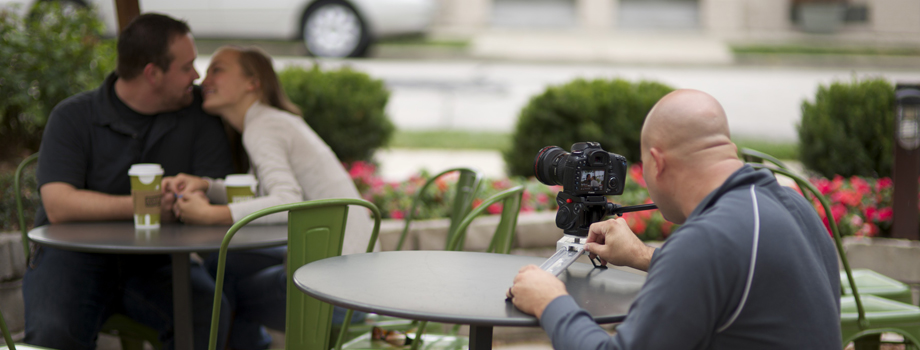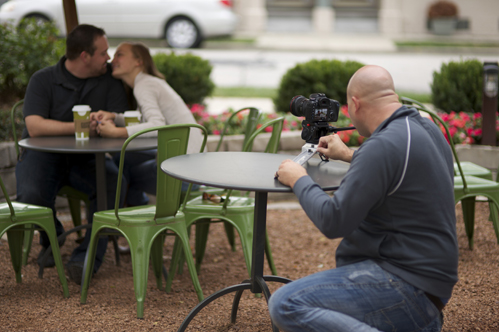Peruse any wedding website’s checklist and you’ll find “book your videographer.” It’s an often-skipped step—brides and grooms balk at the stereotypical eight-hour blow-by-blow DVD. But there’s a new and refreshing alternative on the horizon. Milwaukee area to-be-weds can have something of a cinematic short highlighting the best moments of their wedding, thanks to a cinematographer.
I sat down with Craig Sikora, the Martin Scorcese of Champagne Studios, the Third Ward photography, film and design group, to get his take on the growing wedding must-have. Here, he explains how cinematographers like him can capture the happiest, funniest and most touching sights, sounds and stories of our lives’ extraordinary events. He’s even shared some of his movies—see for yourself.
Sabrina & Mike’s wedding at the Milwaukee Athletic Club
What’s the difference between cinematography and videography?
CS: To me, videography is setting up a video camera on a tripod, pressing play and recording the events. Using the right equipment, in cinematography I make creative decisions and tell your story, and give the audience a special view. And our equipment allows us to do just that: We capture moments videography can’t. For example, how many people get to follow the bride down the aisle by way of an overhead panoramic view?!
How did you get started in cinematography?
CS: I wanted to go into live TV—sports or news—so I did some job shadowing and research, I didn’t like it as much as I thought I would. I came across a website for a Minneapolis studio that was doing wedding cinematography that I’d never seen before. The more I researched that, the more I fell in love with their style, and that’s what opened my eyes to this work I love to do. I could still get the live-event feel, but with cinematography I realized had the opportunity to be creative. I could tell a story.
Where do you find inspiration for new shots and features?
CS: I watch a lot of other cinematographers’ work from across the country. I also take cues from TV shows and movies. In the end, everyone watches TV and movies, and if it’s good, it’s good for a reason. Our eyes are used to seeing certain styles and framing images, and I enjoy trying to figure out why those particular images are pleasing to the eye. Towards the end of a wedding, after I get all the shots I need, I’ll take some risks and experiment using new and different camera angles and techniques.
What’s the process like once a couple hires a wedding cinematographer?
CS: After we sign a contract, the first thing they get is a bottle of Champagne! After that, we’ll usually hang out from one to three times, often with an engagement session in there. We have another meeting a week or two before the wedding day; we go over final details and assure that every piece of their wedding day is in place.
How do you and Riitta, the Champagne Studios photographer, work together at events?
CS: Riitta and I know each other’s creative, space and equipment needs. Before an event, we talk about our plan: how we’ll cover the bride walking down the aisle, for example. It’s an artistic chemistry we’ve built over the last couple of years.
Natalie & Robert’s wedding at Villa Terrace
Once you have the footage, what are the next steps?
CS: First, we sit down and watch it together. Riitta and Rod [graphic designer for Champagne Studios] critique the footage with me and pick out the best shots and audio. Rod also designs all the graphics and helps me with color correction. Once we’re all happy, the film’s done.
It takes about 40 hours to create a film from start to finish, including a few hours of preliminary meetings and phone calls. On the day of the wedding, we typically shoot eight hours or more for a full-day package. Song selection, uploading and editing take anywhere between 15 and 30 hours. Then, I export the film, put it into Apple format so you can watch it on your phone, on TV and elsewhere. That said, the couple is almost guaranteed to see their film within four weeks of their wedding.
Music is such an important part of the movie. How do you select it?
CS: We have four or five music sites that we use, like The Music Bed and Songfreedom. I categorize songs while I’m searching for just the right music for a couple. That way when I meet with them and get to know a little more about their personality, as a couple and as individuals, I can go back and find that certain song that fits them perfectly. Our music use is completely legal and licensed. If you ever hear a song that’s played on a wedding film and you don’t see mention of the music licensure, its use is probably illegal, and the video could be shut down and taken off the Internet.
What other types of movies do you make?
CS: We do a lot of small business promotion films—they want something short for their website that’s well thought out, well put together, and made locally. We also do high school senior films for portrait sessions, engagement Love Story films, save-the-dates, invitation films…I’ve also done maternity and newborn sessions, baby announcements and retirement announcements.
The Hahns’ baby announcement
Why should a couple make room in their wedding budget for a cinematographer and a photographer?
CS: A photographer is going to capture that one moment. But my favorite thing is that when my camera’s on, I’m capturing the moment leading up to it, and the ones coming away from it, too—it’s a fresh, new take on your wedding day. We can be creative, put music to it and capture all the emotion. For example, if you see a picture of your grandma, and then you see a film of her talking or holding you up as a kid, there’s a feeling in your heart that’s a little different. With cinematography, you get to see people living.
At weddings, what are some of your favorite moments to catch on film?
CS: I like the bride walking down the aisle. This is weird to hear from a big ol’ bald guy, but I also love being in the salon! I like hair and makeup—it’s just so much part of my life right now, and I enjoy it. I like the transformation. And any time I can get a guy to do some sort of cool activity in the morning, whether it’s golfing or skeet shooting, that’s always fun, too.
How about for engagement shoots?
CS: We call those Love Stories. First, we interview the couple to get some audio about how they met, what they like to do, what they’re excited for at their wedding and why they love each other. From there, what they want to do is really up to them. Popular activities are to go back to where they got engaged or where they met, or to a park where they walk their dog every day, stuff like that.
MacKenzie & David’s Love Story
What are the biggest misconceptions about cinematography that you want to dispel?
CS: If you break it down, a cinematographer’s work takes longer on the back end than a photographer’s work. The photographer can kick out the final images faster when it comes to color correcting, putting a vignette on them, and everything else. I color correct, line up the images with the audio, set the story to music, cut it up—it takes time. That said, cinematography is a great deal in Milwaukee. If you did a little research, you would find that our prices here are much lower than comparable packages are in Chicago and Minneapolis.
And remember, we’re not videographers—we’re not just there to document the moment and give you an hour-long tape at the end. Our goal is to create a short, sharable, creative film that shows the highlights of your day. We’d love you to share yours on Facebook, through email and on your phone, especially with family and friends who couldn’t come, because the moments here are the best of the best.











